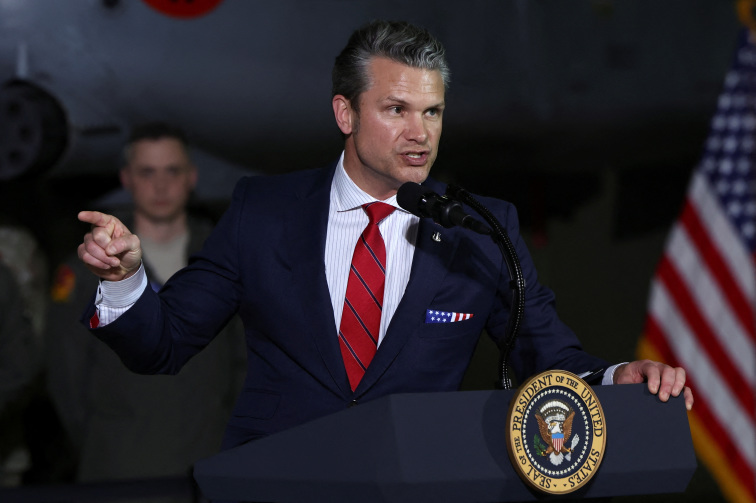Image caption: Miles Yu, Director of the China Centre at the Hudson Institute, U.S. (Photo by Song Bilong / Dajiyuan)
[People News] Nearly a month has passed since the U.S. announced its global tariff plan. While many countries have since entered negotiations with the U.S. over tariffs, China remains defiant. Miles Yu, Director of the China Centre at the Hudson Institute, analysed the state of the U.S.-China tariff war and argued that China is heavily dependent on the U.S. and its current countermeasures amount to nothing more than empty posturing. He asserted that if the Chinese Communist Party (CCP) launches a military attack on Taiwan, it will inevitably escalate into a full-scale war, with the U.S. certain to intervene. Yu also rebutted speculation that the U.S. would betray Taiwan for economic gain.
According to a report by Radio Free Asia, following former President Donald Trump's announcement of a reciprocal tariff policy last month, the U.S. increased tariffs on certain Chinese exports to as high as 245% in response to Beijing’s retaliation. On Monday (May 5), Yu gave a keynote speech at National Chengchi University in Taiwan titled U.S.-China-Taiwan Relations in the Trump 2.0 Era, where he assessed the current state of the tariff war. He stated that China is highly dependent on the U.S., and its retaliatory measures are largely symbolic.
Yu remarked: “I believe that China has no winning hand in the tariff war, either in theory or in practice. The CCP’s greatest trait is simply tough talk. Xi Jinping ordered all Chinese airlines to stop receiving Boeing parts and services, even cancelling plane orders. Yet on the same day this news broke, Boeing’s stock price rose. Why? Because China can’t produce the necessary components itself. Even Xi Jinping flies on a Boeing 747. If they truly stopped receiving Boeing parts and services, he’d have to fly the Chinese-made C919—and I bet he wouldn’t dare. This clearly shows how dependent China is on the U.S. It’s like lifting a rock only to drop it on your own foot. The CCP isn’t just evil—it’s stupid. The only reason the regime survives is because it lacks democracy and public oversight.”
Yu Refutes Anti-U.S. Sentiment
Yu emphasised that during his first term, Trump recognised the great damage to U.S. national interests caused by a policy of "seeking common ground while shelving differences" with China. He therefore shifted U.S. policy, identifying the CCP as America's primary threat. Yu dismissed speculation that Trump or the U.S. might trade Taiwan for benefits from Beijing.
Yu said, “President Trump loves making deals, but he would never accept a bad one. In his first term, he directly negotiated with Kim Jong-un, but when the deal was unsatisfactory, he walked away. The same goes for the CCP. How could he possibly trade away Taiwan? It’s impossible. Every U.S. president and law firmly opposes any use of force to change the status quo in the Taiwan Strait. So I find this anti-U.S. sentiment in Taiwan simply baffling—there’s no basis for it.”
Yu: CCP Invasion of Taiwan Would Spark Total War, Endanger Its Own Stability
Would mounting internal problems, such as the tariff war and economic decline, increase the risk of a CCP military assault on Taiwan? Yu acknowledged China’s military capabilities but said Beijing cannot effectively control the Taiwan Strait and would pay a steep price for war, potentially destabilising its own regime.
Yu explained: “If the CCP strikes U.S. forces in Japan or Guam, do you really believe America’s response would be limited to the Taiwan Strait or the First Island Chain? Impossible. Once war begins, it will be total war. Internally, China’s military and political infrastructure would face severe destruction. Even if the conflict stalemates strategically over Taiwan, China has widespread public dissent and economic issues. Nationalist fervour won’t be enough to prevent backlash—Beijing can't withstand an actual war.”
Yu added that U.S.-Taiwan relations are not based on “strategic ambiguity,” and even without TSMC, ties would remain strong. He described TSMC’s investment in U.S. fabs as a strategy to mitigate risk and foster U.S.-Taiwan tech integration, strengthening America’s security commitment to Taiwan. He advised Taiwan to enhance its defence capabilities and increase its global presence, citing Israel as a model.
Yu said: “TSMC is an important chip for Taiwan on the global stage, but it’s not a ‘national shield.’ Taiwan has many ways to expand its international space, for example, by hosting an international COVID origins summit or a global religious freedom conference. Could Taiwan form a maritime law enforcement alliance with nearby nations like the Philippines, Vietnam, and Japan? These are realistic possibilities. Taiwan could learn a lot from Israel.”
Should the U.S. “Restrain” Taiwan? Yu: U.S. Think Tanks Don’t Understand Taiwan
In response to a U.S. academic article titled Trump Should Rein In Taiwan, which urged Trump to “manage” Taiwanese President Lai Ching-te, Yu criticised U.S. think tanks for misunderstanding both Taiwan and American politics. He said most of these scholars have diplomatic backgrounds and seek to improve U.S.-China relations, but their calls to pressure Taiwan reflect ignorance.
Yu said: “The CCP sees Taiwan’s very existence as a provocation, not because of anything the president says or doesn’t say. Even total silence would be interpreted as a provocation. Beijing intentionally escalates tensions because it benefits from them. In truth, Taiwan’s real provocation isn’t its leaders’ words—it’s the people themselves: your referendums, your elections, your democratic system.”
He concluded that the so-called “Taiwan issue” isn’t about whether Taiwan is part of China, but a broader clash between dictatorship and democracy. He noted that the CCP uses the term “Taiwan independence” ambiguously—it can't even define whether it means a formal declaration or current de facto independence. In his view, the “Taiwan independence issue” is merely an excuse for Beijing to attack.











News magazine bootstrap themes!
I like this themes, fast loading and look profesional
Thank you Carlos!
You're welcome!
Please support me with give positive rating!
Yes Sure!